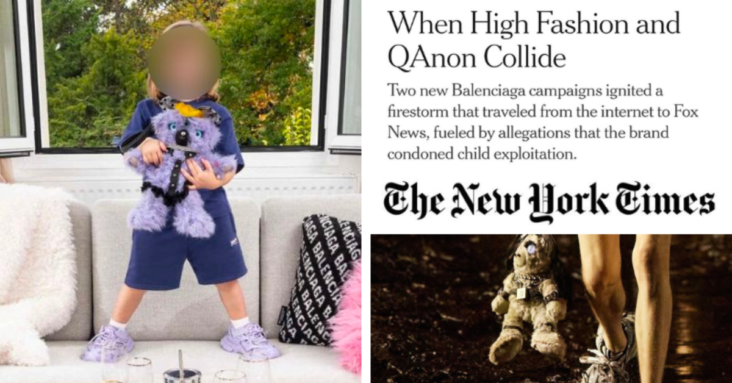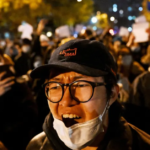
It was just over a month ago that The New York Times was concerned that luxe fashion brand Balenciaga would be damaged by having Kanye West, now Ye, continue as their brand ambassador. Now, the Times is claiming that the brand’s ad campaign promoting child exploitation is a QAnon plot to bring down the Spanish fashion house.
After a detailed explanation of how tasteful Balenciaga’s two recent, controversial ad campaigns actually are, the Times claims that criticism of the ads from Fox News and Tucker Carlson’s criticism are part of a QAnon conspiracy theory that the world of influence is run by an elite cadre of pedophiles.
“The show,” they write, “has helped to publicize and mainstream QAnon, the internet conspiracy theory that ‘a group of Satan-worshiping elites who run a child sex ring are trying to control our politics and media.'”
The Times claims that Balenciaga, under the leadership of Artistic Director Demna since 2015, is “a brand that forces consumers to grapple with the very meaning of ‘taste.'” As such, they’ve determined that the firestorm over the images in an ad campaign for Spring 2023, showing children with sullen looks on their faces clutching teddy bears in bondage gear, “has become one of the most explicit collisions of internet culture, politics, fashion and conspiracy theories to date.”
Fox News, the Times claims, just doesn’t have any taste. Fox News, and their viewers, according to the Times, are essentially rubes who don’t know high fashion or high art even when they are smacked in the face with it in Balenciaga’s ad campaign. Why else wouldn’t they simply take the company’s apology and move on?
On Twitter, where much of the firestorm against Balenciaga took place, the Times faced its own heap of critiques for trying to gloss over the controversy, assign it to the realm of “far-right conspiracy theories,” and cover for the celebrity influencers who pump the brand.
“We see you @nytimes trying to make the Balenciaga scandal into a ‘right wing conspiracy theory’ so you can protect the Kardashians and ignore the severe creepiness of creating and condoning child porn and abuse in fashion,” said self-described “girl mom” Elisha Krauss.
“Kiddy bondage is high fashion. Not liking kiddy bondage is QAnon. – New York Times. The battle is already engaged people. Sooner or later, you must choose a side. This is not a time for luke-warm people,” said one dad.
“Shameful headline equating public outrage over using children in advertising sexual fetish with conspiracy theories. @NYTimes says people ‘alleged’ that #balenciaga condoned child exploitation. It’s not an allegation. It’s a fact! They released the ads,” said Bojana Novakovic.
And these were only a few of the responses pointing to the Times unabashed advocacy for Balenciaga amid this brand crisis.
Balenciaga is a high fashion luxury brand that sells clothes and handbags for thousands upon thousands of dollars. It is not an average consumer brand, but one whose label connotes discerning taste and, above all, vast wealth. In 2021 alone, they generated $1.81 billion in sales, much of that derived from the US, which is the largest luxury market in the world.
For the Times, holding Balenciaga to account for using exploitative images of children to sell their luxury products to high-end consumers is simply beyond the pale.
But for the rest of us, who simply see the images, who don’t step foot into Balenciaga’s retail emporiums, seeing children displayed with leather-clad teddy bears and chains for the amusement and pleasure of wealthy elites and celebrities, it seems like a mirror reflecting their decrepit values and morals back at us. And since child safeguarding is having a moment, those who speak out to protect children against exploitation were able to speak out about it and actually be heard.
When the Times defended Balenciaga’s reputation against criticism of brand-ambassador Ye, he was embroiled in controversy over a “white lives matter” t-shirt (seems a bit quaint now), and the Times was worried that it could sully Balenciaga’s good name.
Fast forward a month and a half, and it’s Balenciaga who bears that shame. Demna, who reportedly was “texting with Ye several times a day,” has seen a fashion industry award revoked, and the company is suffering the slings and arrows that come with having essentially engaged in child exploitation.
Demna severed ties with Ye over his recent anti-semitic comments, but Ye commented last week “You don’t see no celebrities talking about the Balenciaga situation.” His ex-wife, Kim Kardashian, issued her own statement saying that she was “re-evaluating her relationship” with Balenciaga, but it was substantially weak for the mother of four.
The brand has apologized for featuring children in their campaign, saying “Our plush bear bags and the Gift collection should not have been featured with children. This was a wrong choice by Balenciaga, combined with our failure in assessing and validating images. The responsibility for this lies with Balenciaga alone.”
The photographer, the Times notes, “has been inundated with hate mail and death threats, has had jobs canceled and has had personal details, including his phone number, published online.” All he did, the company claims, is take the photos.
Balenciaga apologized, and for the Times, in this specific instance, an apology should be enough.
It is unlikely that the backlash will do anything to damage the company’s sales, as those who are most appalled by the exploitation of children for the purpose of selling luxury goods don’t really buy those goods in the first place. Instead, it is likely that this controversy will do more to drive a wedge between the haves and the have-nots, the global power-hungry elite that rest on a bed of self-involved, narcissistic values that place primacy on desire, and those who simply watch as the parade of horribles marches on.



